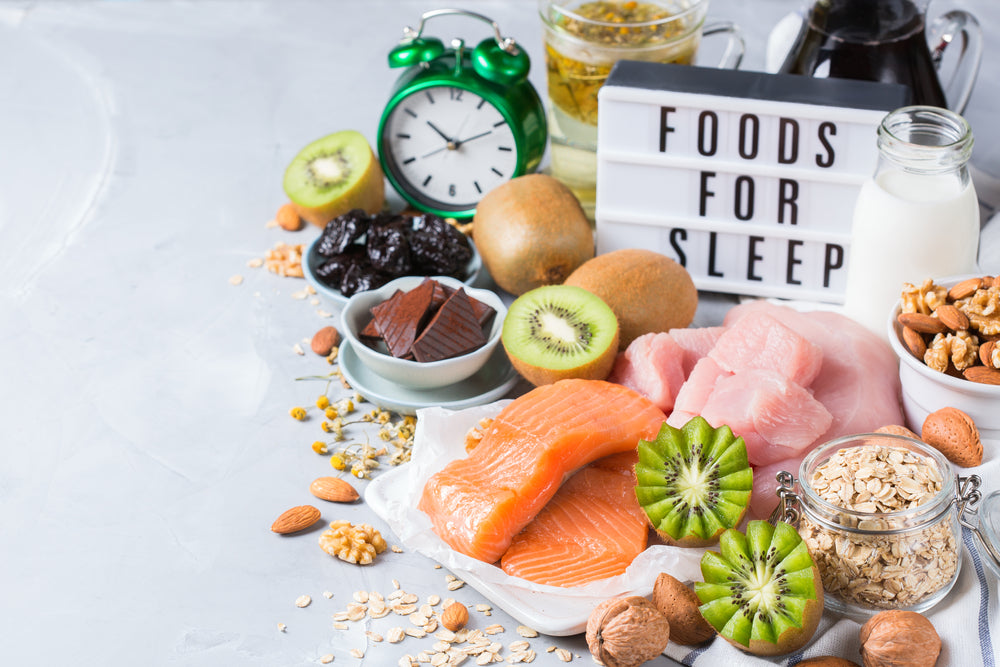Eating for Better Sleep: The Connection Between Nutrition and Rest

Do you ever find yourself tossing and turning at night, unable to drift off into a restful slumber? The culprit might not just be stress or a busy mind; it could also be lurking in your kitchen. Yes, you read that right! What you eat can significantly affect the quality of your rest.
The connection between nutrition and sleep is a powerful one, and making informed choices about what you eat can significantly impact your sleeping patterns.
In this blog, we’ll explore the fascinating connection between nutrition and rest and how making mindful choices in your diet can pave the way for better sleep.
Understanding the Link

To understand better the impact of nutrition on sleep, we must first grasp the intricate mechanisms at play. Several key factors influence our sleep-wake cycle, including the neurotransmitters serotonin and melatonin.
Serotonin is the “feel-good” hormone, which helps regulate mood and sleep. While melatonin is responsible for signaling the body that it’s time to rest.
In correlation to nutrition, certain nutrients found in food can either promote or inhibit the production of these crucial sleep-regulating chemicals.
Fueling Your Sleep: Foods & Nutrients for a Good Night's Rest

It’s no secret that what we eat influences our overall health and well-being. But did you know that certain foods can either promote or hinder your ability to catch those Z’s?
Magnesium-Rich Foods
Magnesium plays a crucial role in regulating neurotransmitters involved in sleep and relaxation. Incorporating magnesium-rich foods like leafy greens, nuts, seeds, and whole grains into your diet can help promote a more restful slumber.
Tryptophan-Containing Foods
Tryptophan is an amino acid precursor to serotonin and melatonin, hormones that regulate sleep. Foods such as turkey, chicken, eggs, nuts, seeds, and dairy products are rich in tryptophan and can support better sleep when consumed as part of a balanced diet.
Complex Carbohydrates
Carbohydrates can aid in the production of serotonin, promoting feelings of calm and relaxation. Opt for complex carbohydrates like whole grains, legumes, brown rice, quinoa, and sweet potatoes, which provide a steady release of energy and contribute to improved sleep quality.
Herbal Teas
Certain herbal teas, such as chamomile, lavender, and valerian root, have been used for centuries as natural remedies for insomnia and promoting relaxation. Sipping on a warm cup of herbal tea before bedtime can be a soothing ritual to help signal your body that it’s time to wind down.
Supplements
In addition to making dietary changes, you may benefit from incorporating sleep supplements into your routine. Supplements like Magnesium Complex, Magnesium Gummies, and 5-HTP often contain ingredients like melatonin and herbal extracts that are believed to support relaxation, promote better sleep, and boost your melatonin and serotonin levels.
Avoiding Sleep Disruptors: Foods to Limit or Avoid

Caffeine
While a morning cup of coffee can provide a much-needed energy boost, consuming caffeine before bedtime can interfere with your ability to fall asleep. Be mindful of your caffeine intake and try to limit it to earlier hours to prevent sleep disturbances.
Highly Processed Foods:
As what our mom told us when we were kids, no sugar before bedtime. That’s because foods high in refined sugars and unhealthy fats can lead to spikes and crashes in blood sugar levels, disrupting your sleep cycle. Aim to minimize your consumption of processed snacks and sweets. Instead, go for whole, nutrient-dense foods.
Alcohol
Aside from the fact that alcohol may initially make you feel drowsy, it can also disrupt the latter stages of sleep, leading to fragmented and less restorative rest. So limit alcohol consumption, especially in the hours close to bedtime to promote better sleep quality.
THE SWEET SLUMBER TAKEAWAYS:
Optimizing your nutrition can have a profound impact on your sleep quality and overall well-being. Keep in mind that small changes in your diet can lead to significant improvements in your sleep patterns, helping you wake up feeling refreshed and rejuvenated each morning. So tonight, why not give your body the nutrients it needs to dream sweetly?
Related Blogs:
- Spring into Slumber: Tips for Better Sleep this Season
- Sleep Tight, Age Right: The Importance of Quality Sleep In Aging
- 10 Tips to Wake Up Early Everyday Without Feeling Tired
- Keys to Productivity: Better Mood, Sleep & Focus
- The Easiest Ways to Have a Good Night’s Sleep
LIKED THIS POST? SHARE IT ON SOCIAL!



